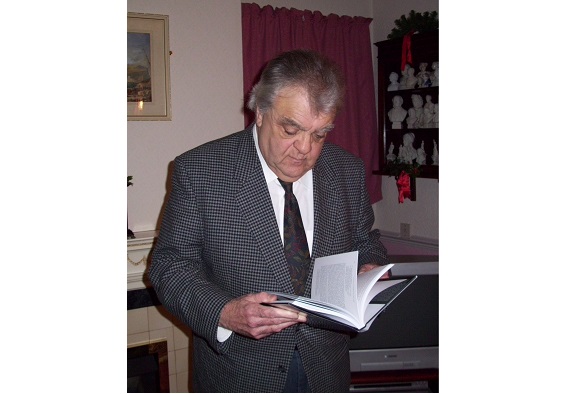Obituary: Professor Vincent Newey
Published on

The University is saddened to learn of the passing of Vincent Newey, a former colleague and Head of English at the University of Liverpool.
Vince was born and raised in the West Midlands, at the heart of what is still known as the Black Country. He attended Dudley Grammar School before going up to New College, Oxford, to study English in 1962. Graduating with a First Class Honours degree in 1965, he accepted a Junior Lectureship at Magdalen College, Oxford, and won a postgraduate scholarship at New College, before taking the post of Lecturer in English Literature at the University of Liverpool in 1967: his first permanent academic position.
Vince remained at Liverpool for 22 years, being promoted to Senior Lecturer in 1982, and serving as Head of Department from 1985 to 1989. It was here that he completed both his B.Litt. (Oxon), in 1971, and a PhD (Liverpool), in 1985, the latter based on the extensive work he had by then published. An effective administrator as well as a highly respected teacher and scholar, in 1989 Vince was appointed Professor of English at the University of Leicester, leading the Department as Head from 1991 to 2000, before taking early retirement in 2006.
Vince was an outstanding literary critic whose specialisms encompassed the poetry of the pre-Romantic and Romantic periods (Cowper, Gray, and Goldsmith, as well as Wordsworth, Keats, Shelley, and Byron) alongside the work of several nineteenth-century novelists (Eliot, Dickens, Hardy, and ‘Mark Rutherford’). Together with two monographs – Cowper’s Poetry: A Critical Study and Reassessment (Liverpool University Press, 1982), and The Scriptures of Charles Dickens: Novels of Ideology, Novels of the Self (Ashgate, 2004) – he also published Centring the Self: Subjectivity, Society and Reading from Thomas Gray to Thomas Hardy (Scolar Press, 1995). He edited numerous collections of essays, including the ground-breaking volume, The Pilgrim’s Progress: Critical and Historical Views (Liverpool University Press, 1980), Bunyan being another writer on whom Vince contributed some exceptional work.
Although he took early retirement in 2006, due to ill health, Vince continued to work with Joanne Shattock as General Editor of the prestigious series, ‘The Nineteenth Century’, for Ashgate/Routledge, as well as editor-in-chief for The Cowper and Newton Journal. He also continued to write, publishing some remarkable articles and essays over the last few years (on Cowper and Bunyan, among other subjects).
Every piece Vince published presents a master-class in the art of literary criticism, and each displays the hallmarks of his enviable style: one that combines acute insight and sensitivity to language and form with an ambitious intellectual vision, all shaped by a delicate yet robust prose crafted to convey something profoundly engaging and formidably perceptive. Bringing all of his gifts as a critic to his lectures and his teaching, he both inspired and supported his students, encouraging them always to take ‘the calculated intellectual risk’: in that way, we ‘further the subject’, as he put it.
A keen advocate for the study of English, Vince threw himself into a range of professional activities beyond those at Liverpool and Leicester, being instrumental in the formation of the British Association for Romantic Studies and working tirelessly as a Fellow of the English Association.
Despite his considerable administrative duties Vince continued to teach undergraduates and postgraduates throughout his career, many of whom would be inspired to teach English in schools and universities both in the UK and internationally. Former students commenting through Twitter have remembered Vince as ‘warm and approachable’, ‘good at opening minds’, ‘a generous supervisor and mentor’, and ‘a lovely, warm and inclusive tutor’. The word ‘kind’ comes up frequently in these recollections.
A collection of essays, Literature and Authenticity, 1780–1900, was published in Vince’s honour in 2011, with contributions from many of his former colleagues in English here at Liverpool. The ‘Afterword’ of this volume pays full tribute to Vince’s achievements, and to his incomparable strengths as a reader, teacher, critic, colleague, and friend.
Vince died on Saturday 16 May, aged 76. He is survived by his wife Sue, and their two sons, Matthew and Nathan. He will be missed.
Words by Dr Michael Davies, Department of English